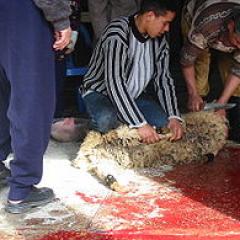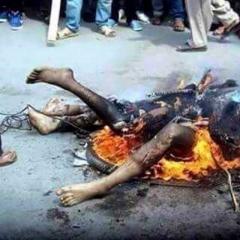Vicious circle. Why will the conflict in Myanmar not end? Muslims are burned alive in Myanmar Myanmar Muslims are burned alive
In the state of Arakan in Myanmar, over the past three days, about two to three thousand Muslims have died as a result of military attacks, more than 100 thousand Muslims have been evicted from their homes.
As transmits website Anita Shug, spokeswoman for the European Rohingya Muslim Council (ERC), told Anadolu News Agency.
According to her, in recent days, the military has committed more crimes against Muslims in Arakan than in 2012 and October last year. “The situation has never been so dire. A systematic genocide is practically being committed in Arakan. Only in the village of Saugpara in the suburbs of Rathedaung the day before there was a bloodshed, as a result of which up to one thousand Muslims died. Only one boy survived,” Shug said.
According to local activists and sources, the Myanmar army is behind the bloodshed in Arakan, an ERC spokeswoman said. According to her, at the moment, about two thousand Rohingya Muslims evicted from their homes in Arakan are on the border between Myanmar and Bangladesh, since official Dhaka decided to close the border.
The spokeswoman also said that the villages of Anaukpyin and Nyaungpyingi are surrounded by Buddhists.
“Local residents sent a message to the Myanmar authorities, in which they noted that they were not to blame for the ongoing events, and asked to lift the blockade and evacuate them from these villages. But there was no answer. There is no exact data, but I can say that there are hundreds of people in the villages, and all of them are in great danger,” Shug added.

Earlier, Arakan-based activist Dr. Mohammed Eyup Khan said that Arakanese activists living in Turkey called on the UN to help immediately end the bloodshed against Rohingya Muslims in Arakan state by Myanmar military forces and Buddhist clerics.
“There is an unbearable atmosphere of persecution in Arakan: people are killed, raped, burned alive, and this happens almost daily. But the government of Myanmar does not allow into the state not only journalists from other countries, representatives of humanitarian organizations and UN employees, but also the local press,” Eyup Khan said.
According to him, in 2016, several young Muslims, unable to withstand the pressure of the authorities, attacked three checkpoints with clubs and swords, after which the Myanmar government seized the opportunity to close all checkpoints, and security forces began to attack towns and villages in the state. Arakan, killing local people, including children.
The activist recalled that on July 25, the UN established a special commission of three people, which was supposed to identify the facts of persecution in Arakan, but official Myanmar said it would not allow UN employees to the state.
“Taking advantage of the inaction of the international community, on August 24, government forces besieged another 25 villages. And when the locals tried to resist, bloodshed began. According to the data we received, about 500 Muslims were killed in the last three days alone,” Eyup Khan said.
According to UN norms, genocidal countries should be sanctioned, but the international community does not accept the fact that Rohingya Muslims in Myanmar are being genocided, the activist said. “The UN prefers to call what is happening here not genocide, but ethnic cleansing,” Eyup Khan said.
According to him, about 140 thousand people in Arakan were expelled from their places of permanent residence. Muslim houses are burned in the state and placed in camps.
According to the activist, the Islamophobic sentiments that have prevailed in Myanmar since the early 1940s are part of a special plan, according to which the Myanmar government and Buddhists are trying to purge Muslims from Arakan state using the most brutal methods.
Turkish Deputy Prime Minister Bekir Bozdag said that Ankara strongly condemns the massacres of Muslims in Myanmar, which are "in many ways similar to acts of genocide."
“Turkey is concerned about the increase in violence, killing and injury of Myanmar residents. The UN and the international community should not remain indifferent to these events, which in many ways resemble genocide,” Bozdag said.
The events in Myanmar, where the confrontation between Muslims and Buddhists escalated into an open war, caused a mixed reaction in the world community. The actions of local authorities and residents who profess Buddhism, when many adherents of Islam were forced to flee the country, some politicians even hastened to call genocide. However, if you recall, the earlier Muslim population of Myanmar repeatedly attacked Buddhist shrines and provoked inter-religious clashes. The situation has gone so far that the Myanmar government has attracted troops to restore order, and the Asian country itself has become the center of attention of the world community.
The news of recent days is as follows: over 70 thousand representatives of the Rohingya people who profess Islam fled from the west of Myanmar to neighboring Bangladesh. As they say, they were forced to do so by the outbreak of violence in Rakhine State. And although it began at the end of August, what was happening received publicity only in the first days of autumn.
ON THIS TOPIC
According to Myanmar's military, several hundred people died in the clashes, most of them representatives of the Rohingya, whom the country's authorities call militants. As the refugees themselves say, army units, Myanmar security services and ethnic groups, mainly practicing Buddhism, attacked Muslims, burned their houses and expelled them from their places of residence.
Refugees who managed to get to Bangladesh have announced a campaign to push members of the Muslim minority out of Myanmar. They said that government troops indiscriminately fired on unarmed people, including children and women. To avoid the massacre, people are trying to reach Bangladesh by crossing the Naf River. However, this is not possible for everyone. Every day, border guards discover the bodies of dozens of Muslims who drowned during the crossing.
A number of countries are trying to put pressure on Bangladesh, urging the country to accept a large number of refugees from Myanmar. It even went so far that this issue was proposed to be brought up for discussion by the UN Security Council. However, it did not come to this - the proposal was blocked by China.
The conflict in Myanmar, analysts say, was quite predictable. The main question was when it would break out. After all, the confrontation between the Muslim minority and the Buddhist majority in this state has been going on for more than one year. Each side regularly accuses opponents of violence and destruction of property.
Aggression became especially violent on August 25, when local Islamists organized attacks on police posts and army bases, explaining their actions by the persecution of an ethnic minority. Rohingyas who have fled to Bangladesh speak of burning houses and forcing them out of Myanmar. However, the country's official authorities claim that Muslims themselves burn their villages, and law enforcement agencies protect citizens from terrorists and extremists.

A significant role in the attacks on government institutions and citizens is played by militants of the Islamic organization "Arakanese Salvation Army of the Rohingya". It is they who are called involved in the burning of local monasteries and the desecration of Buddhist shrines. The Myanmar authorities have officially recognized the organization to which the Islamists belong as extremist. This event became a catalyst for the conflict, as a result of which the latter attacked three dozen police strongholds at once.
Angry citizens, as noted by the media, tried to destroy everything related to Buddhism: religious buildings, Buddha statues, from which they beat off their heads. The anger of the Rohingya is explained by the fact that their rights in Myanmar are very strongly infringed: the country's authorities consider them illegal migrants from Bangladesh, denying them citizenship. The expulsion of representatives of this nationality is demanded by local nationalists, who are called the initiators of violence against Muslims.
The conflict between representatives of the two religions has been going on for decades. Its escalation to fighting and a virtual humanitarian catastrophe began after the transfer of power in Myanmar from a military to a civilian government five years ago. Prior to this, the number of the Rohingya people was estimated at about 800 thousand people. Recently, this figure has been rapidly declining due to the fact that many of their settlements were destroyed, and the survivors seek to emigrate to Bangladesh.
Sacrificial meat distributed among more than 3 million people in need
Turkish Red Crescent on Eid al-Adha distributed the meat of 125 thousand heads of cattle in 33 countries, including Turkey, said the head of the Turkish Red Crescent Kerem Kinik.
“Sacrificial meat has been distributed among more than three million people in need,” Kynyk said.
According to him, 2,275 heads of cattle have been sacrificed this year in Bangladesh, the meat of which is distributed among refugees from Arakan.
Refrigerators delivered 22,000 packages of sacrificial meat to the border of Bangladesh and Myanmar.
In Pakistan, the Turkish Red Crescent has distributed the meat of 14,000 cattle to some 200,000 people in need.
In Niger, meat from 14,000 head of cattle has been distributed among the needy, in Chad - 5,250, and in Burkina Faso - 3,500.
In the Syrian city of Aazaz, the Turkish Red Crescent distributed the meat of two thousand heads of cattle among the needy, in Iraq - 1050 heads, in Palestine - 420.
The Turkish Red Crescent (tour. Türkiye Kızılay Derneği) is the largest Turkish medical care organization that is part of the international Red Cross and Red Crescent movement.
The Turkish Red Crescent was founded on June 11, 1868 in the Ottoman Empire under the name Osmanlı Yaralı ve Hasta Askerlere Yardım Cemiyeti (Ottoman organization for wounded and sick soldiers). Since then, it has changed its name several times. In 1877 it became known as Osmanlı Hilal-i Ahmer Cemiyeti (Ottoman Red Crescent Organization). The name Türkiye Kızılay Cemiyeti (Organization of the Red Crescent of Turkey) received in 1935 after the formation of the Turkish Republic from its leader Kemal Atatürk. Its first leader was a Greek by origin, Marko Pasha (Markos Apostolidis). It received its current name in 1947.
The Turkish Red Crescent is led by an 11-member commission (Yönetim Kurulu). Its current chairman is Kerem Kınık. There is also a Red Crescent Supervisory Board (Denetim Kurulu), a Directorate General for Management (Genel Müdürlük) and a Council for Women and Youth Affairs. The governing bodies of the organization are located in Ankara. There are more than 650 branches of the Red Crescent throughout Turkey. Its supreme body is the General Assembly (Genel Kongre), which brings together representatives of all departments and governing bodies of the Red Crescent. The General Assembly takes place annually in April.
The goals of the organization are expressed as follows:
Turkish Red Crescent Society is a humanitarian organization that provides relief to the vulnerable and those in need by mobilizing the power and resources of the community to protect human dignity anytime, anywhere, under any conditions and support the enhancement of the community's capacity to cope with disasters .
The work of the Turkish Red Crescent is also based on the seven basic rules adopted at the XX International Conference of the Red Cross Societies in 1965 in Vienna: humanism, non-partisanship, neutrality, independence, voluntariness, unity and universality.
The Turkish Red Crescent sees its tasks in providing all possible assistance in overcoming natural disasters and their consequences, organizing donation, measures to restore health (rehabilitation), conduct educational activities in the fields of sanitation and health hygiene.
The Turkish Red Cross is financed not by the state, but by private donations, membership fees, charitable events, special stamps, etc.
President of Tatarstan Rustam Minnikhanov congratulated the people of Tatarstan on the blessed holiday of sacrifice Eid al-Adha.
The President of the Republic noted that today the desire of believers for peace and unity is especially felt. “All of us, both those who make the expiatory Hajj and those who celebrate Eid al-Adha near their homes, are waiting and hoping that the Almighty will hear our sincere prayers and give us faith and strength to do good deeds, setting a pious example for our children and grandchildren, ”the congratulation says.
The eternal values professed by Muslims, Christians and representatives of other traditional religions form the basis of human existence, cultivating a high sense of responsibility for our families, the future of the republic, the country and the entire world civilization, Minnikhanov continued.
“In Tatarstan, which has become a common home for people of many nationalities and religions, Eid al-Adha is one of the most revered and widely celebrated holidays. May our souls open completely before Allah, and our good deeds make us spiritually richer and cleaner!” - said the President, wishing the inhabitants of the republic optimism, happiness, health and well-being!



